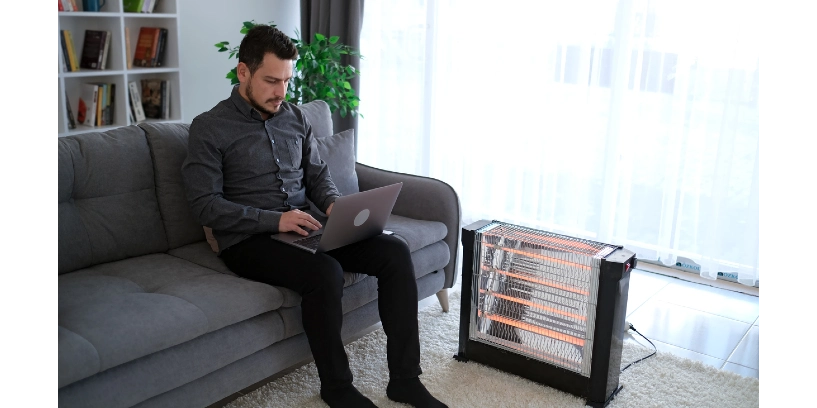The Various Types of Home Heating Systems

Why We Use Heating Appliances
Indoor temperature regulation is one of the great perks of the modern world. Businesses and residences now rely on heating technologies to stay toasty and warm when winter weather turns for the worst. At Harris Aire Serv, we understand that it can be difficult to determine which heating system is best for your property. After all, there are many different types of heating appliances and methods available on the market.
Today, we’ll outline the various heating systems and their pros and cons. Hopefully, this information will clarify what heating style works best for your situation.
The most common types of home heating appliances include:
Heat Pumps
Some individuals refer to furnaces as heat pumps, but this is inaccurate. In fact, they are very different heating systems. Furnaces generate heat by burning fuel. On the other hand, heat pumps gather heat from outside and redistribute it indoors. This system may initially sound somewhat difficult to believe. Many people wonder how heat pumps accumulate heat energy on freezing cold days. The truth is even cold weather contains heat energy that can be collected and engineered for conditioning purposes.
One downside of a heat pump is that the appliance absorbs and retains cold energy while channeling the warm air into the building. As a result, a heat pump will need to cycle on and off periodically to defrost itself. This defrosting process will thus require the heat pump to remain dormant when you need warmth the most. At the same time, heat pumps offer significant advantages.
They provide:
- Impressive energy efficiency
- Eco-friendly, emission-free heating
- The option of coupling a heat pump system with an air conditioner for a centralized HVAC unit
- The option of combining heat pumps with a gas furnace for a “dual fuel” heating system, providing dependable heat from two technologies
Furnaces
Furnaces are a modernized version of the most primitive method of heating. They burn fuel to create heat – relying on an enclosed flame for sustained and controlled warmth. A furnace may be old-fashioned, but it comes with many upsides – offering flexibility and energy efficiency. Unlike a heat pump, a furnace will not need to defrost. This means you can switch your furnace on and off whenever you desire.
Modern furnaces use natural gas. Natural gas offers high levels of cheap energy with low-emission levels. The natural gas creates heat by burning in a burner, which in turn pushes the warm air through a heat exchanger. The heat exchanger then siphons the heated air into the central duct system via a blower fan. This process allows warmth to disperse throughout an entire home, whereas a traditional fireplace (which undergoes the same basic processes) can only warm its immediate vicinity.
Boilers
Boilers are less popular than the previous two types of heating we’ve discussed. We believe they are unfairly overlooked and underrated. Water is an excellent and effective conduit for transferring heat. As a high-powered water heater, a boiler maximizes this efficient medium by using water to spread warmth throughout a business or home.
Many property owners avoid boilers due to their high upfront costs and installation expenses. Boilers require specialized plumbing lines, radiators, floor heating grids, and more. Each of these components works together to distribute heated water throughout a home. Thus, while modern boilers are energy efficient due to the ease of warming water quickly with very little energy, they’re reliant upon complex systems that must be expertly installed.
That said, we recommend considering the long-term advantages of a water boiler. A modern boiler can effectively heat any spatial dimensions or floor layout. Most boiler systems also deliver hot water to showers and faucets, thereby rendering the need for a water heater moot. For regions where below-freezing temperatures are common, boilers can be a lifesaver. Unfortunately, boilers are also susceptible to leaks, which can cause significant property damage.
Solar, Electric, & Portable Heating
Solar heating creates warmth from the sun’s energy. Despite steep upfront costs, solar heating systems have many benefits. They can:
- Save you money long term by eliminating electricity usage
- Reduce air pollution and greenhouse gases released when burning fossil fuels for heating
- Store unused heat energy for later
- Work with backup energy sources to ensure reliable heating
We do recommend having a secondary heating source for emergencies. Because solar heaters require direct sunlight to generate energy, there may be insufficient energy reserves if you experience cloudy, rainy, or foggy weather. Another downside of solar heating is the space required for solar panels and the aesthetic eyesore of having large solar panels on one’s roof.
Perhaps you only need localized heating. If so, we suggest looking into electric heaters. Electric heating systems generate heat from the electrical circuit. Simply plug the heater into an outlet, turn it on, and you should be good. Electrical heating systems require minimal maintenance and cost less to install than other options. Portable electric heaters are another convenient solution for rooms/spaces that do not receive heat from a central HHVAC system. This option can spike monthly electricity usage and pose fire threats if left unattended.
Needing HVAC Assistance? Call Aire Serv Anytime!
Harris Aire Serv is proud to be your one-stop destination – regardless of which heating system works best for your property. Our team can install, maintain, repair, and upgrade HVAC systems quickly, affordably, and efficiently. For reliable service backed by dependable warranties, call our Harris team today! We service Toole & Stansbury Park, West Jordan, South Jordan, Cottonwood Heights, and Sandy!
Want a new heating system? Schedule an appointment by calling!
 Click to call
Click to call


